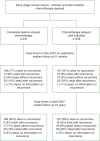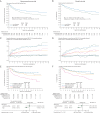Optimal treatment of early-stage ovarian cancer
- PMID: 24631948
- PMCID: PMC4037858
- DOI: 10.1093/annonc/mdu116
Optimal treatment of early-stage ovarian cancer
Abstract
Background: There is no clear consensus regarding systemic treatment of early-stage ovarian cancer (OC). Clinical trials are challenging because of the relatively low incidence and good prognosis. Initial results of the International Collaborative Ovarian Neoplasm (ICON)1 trial demonstrated benefit in both overall survival (OS) and recurrence-free survival (RFS) with adjuvant chemotherapy. We report results of 10-year follow-up to establish whether benefits are maintained longer term and discuss how this and other available evidence from randomised trials can be used to guide treatment options regarding the need for, and choice of, adjuvant chemotherapy regimen.
Patients and methods: ICON1 recruited women with OC following primary surgery in whom there was uncertainty as to whether adjuvant chemotherapy was indicated. Patients were randomly assigned to adjuvant or no adjuvant chemotherapy. Platinum-based chemotherapy was recommended and 87% received single-agent carboplatin. Analyses of long-term treatment benefits and interaction with risk groups were carried out. A high-risk group of women was defined with stage 1B/1C grade 2/3, any stage 1 grade 3 or clear-cell histology.
Results: With a median follow-up of 10 years, the estimated hazard ratio (HR) for RFS was 0.69 [95% confidence interval (CI) 0.51-0.94, P = 0.02] and OS 0.71 (95% CI 0.52-0.98, P = 0.04) in favour of chemotherapy. In absolute terms, there was a 10% (60%-70%) improvement in RFS and a 9% (64%-73%) improvement in OS; the benefit of chemotherapy might be greater in high-risk disease (18% improvement in OS). Uncertainty remains about the optimal chemotherapy regimen. The only randomised trial data available are from a subset of 120 stage 1 patients in ICON3 where the treatment difference, comparing carboplatin with carboplatin/paclitaxel was estimated with relatively wide CIs [progression-free survival HR = 0.71 (95% CI 0.39-1.32) and OS HR = 0.98 (95% CI 0.49-1.93)].
Conclusions: Extended follow-up from ICON1 confirms that adjuvant chemotherapy should be offered to women with early-stage OC, particularly those with high-risk disease.
Clinical trial numbers: ISRCTN11916376 for ICON1 and ISRCTN57157825 for ICON3.
Keywords: ICON1; ICON3; adjuvant chemotherapy; early-stage ovarian cancer.
© The Author 2014. Published by Oxford University Press on behalf of the European Society for Medical Oncology.
Figures



References
-
- SEER_faststats: Stage Distribution (SEER Summary Stage 2000) for ovarian cancer, all ages, all races, female: 2000–2008.
-
- Oncology FCoG. Current FIGO staging for cancer of the vagina, fallopian tube, ovary, and gestational trophoblastic neoplasia. Int J Gynaecol Obstet. 2009;105:3–4. doi:10.1016/j.ijgo.2008.12.015. - DOI - PubMed
-
- Young RC, Walton LA, Ellenberg SS, et al. Adjuvant therapy in stage I and stage II epithelial ovarian cancer. Results of two prospective randomized trials. N Engl J Med. 1990;322:1021–1027. doi:10.1056/NEJM199004123221501. - DOI - PubMed
-
- Holschneider CH, Berek JS. Ovarian cancer: epidemiology, biology, and prognostic factors. Semin Surg Oncol. 2000;19:3–10. doi:10.1002/1098-2388(200007/08)19:1<3::AID-SSU2>3.0.CO;2-S. - DOI - PubMed
-
- Heintz AP, Odicino F, Maisonneuve P, et al. Carcinoma of the ovary. FIGO 26th Annual Report on the Results of Treatment in Gynecological Cancer. Int J Gynaecol Obstet. 2006;95(Suppl 1):S161–S192. doi:10.1016/S0020-7292(06)60033-7. - DOI - PubMed
Publication types
MeSH terms
Substances
Grants and funding
LinkOut - more resources
Full Text Sources
Other Literature Sources
Medical
Molecular Biology Databases

